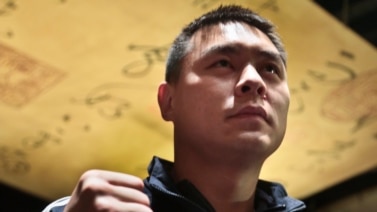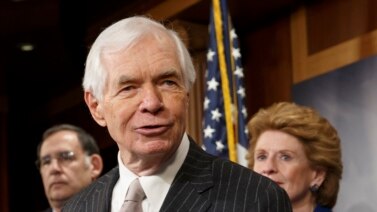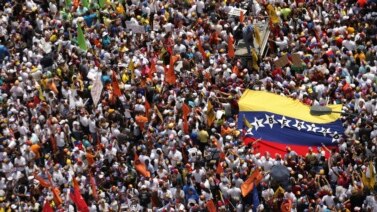
Hi again. Nice to have you with us on As It Is, from VOA Learning English. I’m Kelly Jean Kelly.
If you were in front of the United States Supreme Court building in Washington, DC, this week, you would have heard this:
“USA, USA!”
Those shouts were from people who support gay marriage. They were reacting to the court’s decision to permit same-sex married couples to receive federal tax, health and retirement benefits. In other words, the federal government will treat homosexual marriage the same as heterosexual marriage.
Five of the nine justices supported the decision. Justice Anthony Kennedy wrote the majority opinion. He said the U.S. Constitution guarantees equal protection under the law.
However, the Supreme Court did not say every state must permit same-sex marriage. Currently, same-sex marriage is legal in 13 states and Washington, DC.
Among opponents of the decision is the Reverend Rob Schenck. He represents an organization of Christians.
“One thing true about today’s court decisions on marriage, they do not change the biblical or timeless truth of the nature of marriage as between a man and a woman.”
Other opponents of same-sex marriage promised they would fight the ruling. Congressman Tim Huelskamp is a Republican from Kansas.
“The court has taken it upon itself the attempt, a radical attempt, to redefine marriage. With this decision the courts have allowed the desires of adults to trump the needs of children. Every child deserves a mommy and a daddy.”
President Barack Obama welcomed the court’s decision on same-sex marriage. He learned about the decision while flying to Africa.
Mr. Obama called Edie Windsor from his plane, Air Force One. Ms. Windsor brought the case to the Supreme Court. She was married to a woman named Thea Spyer. The state of New York recognized their marriage. But, when Ms. Spyer died, the federal government said Ms. Windsor had to pay taxes on her wife’s property. Heterosexual spouses do not have to pay taxes when one of them dies.
The president congratulated Ms. Windsor, who is 84-years-old, on her victory. According to a spokesperson for the White House, Mr. Obama told Ms. Windsor he was happy that loving, committed couples could enjoy full equality under the law.
Ms. Windsor said this to reporters in New York City:
“To all of the gay people and their supporters who have cheered me on, thank you, thank, you thank you! Okay, I am sure Thea is thanking you too.”
David Boies is a lawyer who argued another gay rights case before the Supreme Court. The justices said they did not have the right to rule in that case, for technical reasons.
The case involved a ban against same-sex marriages in the state of California. The justices' decision means that same-sex couples may once again be legally married in California. Lawyer David Boies said he believes same-sex marriages will soon be legal across the country.
“The United States Supreme Court held that there was no purpose for depriving gay and lesbian couples of the right to marry the person they love. There was no legitimate justification for that.”
The leader of the U.S. House of Representatives was one of those disappointed by the Supreme Court’s decision. House Speaker John Boehner said the country will continue to discuss the issue of same sex marriage.
This week Americans will celebrate their Independence Day. The holiday, known as the Fourth of July, remembers the day the Continental Congress adopted the Declaration of Independence from Britain in 1776. Five years later, in 1781, the British army surrendered to American and French forces.
Most Americans learn about the Revolutionary War in school. But author Andrew O’Shaughnessy says many people do not have a complete picture of the conflict. He has published a new book that tells about the British leaders of the war. Steve Ember reports on Professor O’Shaughnessy’s book, “The Men Who Lost America.”
In 2000, an American movie called “The Patriot” told a story about the Revolutionary War. The movie starred Mel Gibson. Professor Andrew O’Shaughnessy says “The Patriot” and other movies show the British war leaders as aristocratic and foolish.
“Lord Cornwallis is presented always in immaculate scarlet uniform back at headquarters more worried about his dogs than winning the war.”
But Mr. O’Shaughnessy, who is British, says the British soldiers and politicians were not bad leaders. Instead, he says they were, in his words, “men of substance.”
And, he says Britain had an opportunity to win the war in 1776—the same year the American Declaration of Independence was signed. Britain had a strong army. But, Mr. O’Shaughnessy says while Britain’s army could win battles, they could not keep power over the people.
“One of the British generals, Henry Clinton, actually used the phrase ‘winning hearts and minds.’”
Mr. O’Shaughnessy says the British leaders believed the American colonists supported them. So, they were surprised when Americans took their supplies, or when local militias fought them.
Mr. O’Shaughnessy says he is not trying to comment on current wars in his book. But, he says he sees a connection.
“It’s very, very difficult both today in Afghanistan and for the British in America in the 1770s, it’s very difficult to fully gauge where opinion lies.”
Mr. O’Shaughnessy says American soldiers in the Revolutionary War made mistakes, too. But in the end, he says the American patriots were fighting under better conditions.
And, he adds that it is not fair to American generals like George Washington to say they won the war just because the British were not good leaders. General Washington, he says, had to fight a military and a political war, and he won both.
I’m Steve Ember.
And I’m Kelly Jean Kelly.
See you next time on As It Is. If you would like to reach us, send an email to learningenglish@voanews.com. Or go to our website at learningenglish.voanews.com and click on “Contact Us.”





